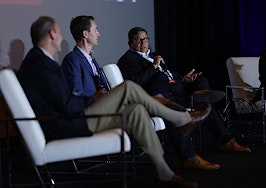Inman Connect is LIVE Aug. 8-10! Join us for impactful interviews, cutting-edge conversations and networking with thousands of real estate pros. Get valuable takeaways to thrive in a rapidly shifting market. Can’t come to Vegas? Register now for a virtual ticket.
Almost exactly a decade ago the head of a big broker group issued a warning to multiple listing services that would reverberate for years: “You’ve got 10 days.”
That pronouncement came amid a fiery debate at the time about the role of MLSs, the services they should or should not provide, and whether they compete with brokerages.
Now, how has the relationship between brokers and MLSs changed? That’s a question moderator Greg Robertson of industry blog Vendor Alley asked panelists Wednesday afternoon at Inman Connect Las Vegas in a session called, “How Can the MLS Be a Broker’s Business Partner?”
Amy Gorce, acting CEO of MLS joint venture REdistribute, said there was now greater mutual appreciation between brokers and MLSs.
“Whether that’s because our entire industry has come under fire, or because there’s just been the proper evolution, I think at the end of the day, when we think about life without a multiple listing service, no one really wants to think about losing the effectiveness of this great marketplace that we’ve built,” Gorce said.
Joshua Coleman, business development representative at transaction management firm SkySlope, said he’s increasingly seen how brokers and MLSs collaborate “with the goal of really empowering the everyday agent to transact more and to transact better.”
Even large MLSs with tens of thousands of subscribers will ask their top 10 or 15 largest brokerages what their agents need to succeed, Coleman noted.
“I think [the relationship] definitely changed positively and it’s continuing to do so,” he said.
Gene Millman, CEO of REcolorado, said that MLSs have to stop guessing what brokers want.
“I think we guessed a long time,” Millman said. “I think [we should be] really going out and starting to engage with them and really start to ask them what they want.”
Years ago, brokers were concerned that MLSs providing agents with technology would “level the playing field” between brokers as competitors, but now brokers and MLSs realize they need each other to succeed, according to Millman.
“If we succeed, our broker participants succeed,” Millman said. “If they succeed, we succeed.
“At the end of the day, the MLS was born to serve the brokers. We have to be careful to never forget that. We have to be the source of their data. We have to protect it. And we have to help create an effective ecosystem for them to work in because if we serve them well, we serve the end-consumer, which is the buyer and seller.”
Robertson then quipped that he hoped another panelist, Greg Fischer, managing principal broker at West+Main, will “tell everybody they’re full of shit,” prompting laughter from attendees.
Fischer didn’t rise to the bait. He started off by saying that brokers need to provide input to MLSs, not just take what’s available.
“Having a relationship where the MLS execs and their staff are interested in the problems we need, when they’re serious about it, it creates a conduit for us to get things that we want,” Fischer said.
“The MLS showing up and watching us use products, asking us what we need, talking to our managing broker, staff and agents and finding out what do we need this year and next year, and afterwards? It’s not something we encounter all the time with all the other vendor partners that we may use. So I think we’re seeing an opportunity to engage and push things forward.”
He said he thought it was “silly” to think of MLSs as competitors to brokers.
“It’s an interface that we use to power our very sophisticated small business and so we rely on them the same way we provide a backstop for agents as a broker,” Fischer said. “We don’t compete with our agents in that respect. We look at MLS as a service, and something that we can put value back into and they’re serious about our needs.”
Robertson asked Fischer, who is a member of REcolorado and a director on its board, if there was something he wished the MLS would change.
MLSs should use their leverage to push for interoperability between core tools such as those for showings and contracts, Fischer said.
“Putting some pressure on the vendors to create an ecosystem where multiple products can truly exist and iterate and become better where the different participants might be on different platforms and for that data to be shared is what the MLS is in a perfect position to help facilitate and it takes a little bit of guts to tell vendors that we need them to comply,” Fischer said.
Millman said he couldn’t agree more, though he said interoperability is “not something completely in our control” and favored offering brokers a choice of products.
“The brokers can make the choice of what they feel is best for their business, but those different programs should be able to talk to each other,” Millman said.
A few of the most innovative MLSs have begun decoupling data from tools and systems so that brokers can get the data they need to run their businesses independent of the platforms they use, according to Gorce.
“Should [MLSs] still offer platforms? Absolutely,” Gorce said. “But I think that decoupling of the data has really empowered brokers to be able to differentiate themselves.”
Robertson gave himself the last word, bringing up a perennial topic in the industry: MLS consolidation, or lack thereof.
“The No. 1 thing I hear brokers complain about MLSs is that there’s just too many of them,” Robertson said.
Editor’s note: This story has been corrected to note that Greg Fischer is managing principal broker at West+Main.













